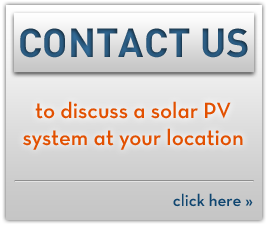Why are commercial property owners installing Solar PV systems?
- Lower and Stabilize Energy Costs: Depending upon the size of the available roof space, Solar PV systems can produce up to 100% of the property electricity consumption. This stable, known production, can last 25 years or longer, while local utility rates climb on a annual basis.
- Peak Shaving & Price “Lock In”: Most property owners are also subject to utility “Peak Use Charges." The peak use charge can be significantly higher than the stated kWh utility rate. This is because electricity charges are more expensive during hours of peak demand, typically during summer day-time hours. However, this is also the time when a Solar PV system is producing maximum energy on your rooftop. Avoiding these surplus charges adds significantly to the energy cost savings produced by the system.
- Predictability: Solar PV systems have a utility rated, highly predictable system output. Solar panels come with 25 year warranties providing long term predictability of system production and energy savings.
- The Financial Benefits from the Investment: The combination of energy savings, significant Federal and State incentives, and available financing options, have made investments in Solar PV systems an excellent investment for property owners. Depending on how the project and ownership is structured, and the amount of financing leverage employed, it is possible for Solar PV systems to have positive cash flows in the first year of production and provide for a very high Internal Rate of Return (IRR). Some of the pertinent incentives and financing arrangements are:
- 30% Federal Tax Grant/Investment Tax Credit (ITC): The American Recovery and Reinvestment Act of 2009 created a renewable energy cash grant program. This program allows a Solar PV system owner to receive a direct cash grant for 30% of the project cost. The program is administered by the U.S. Dept. of Treasury. Payments are made within 60 days of receipt of completed applications. The Federal Tax Grant is scheduled to end on December 31, 2010. Unless congress extends the program, the only way to qualify for the cash grant is to have the project begin prior to year end. In lieu of the Tax Grant, a system owner can take the ITC as a credit against current and future tax liabilities
- Accelerated Depreciation: Another major incentive for the installation of Solar PV systems is the federal Modified Accelerated Cost-Recovery System (MACRS), which allows system owners to recover their investment through accelerated depreciation. Solar equipment can be depreciated over a five year period. The basis is the full system cost minus 50% of the ITC, or effectively, 85% of the cost. For a system owner with an assumed 35% tax bracket, the value of the depreciation could be worth as much as 30% of the cost of the installation.
- Solar Renewable Energy Certificates (SRECs): For each 1000kWh of electricity generated by a Solar PV system, one SREC is issued to the system owner which can then be sold or traded separately in an open market. Over the past several years, New Jersey has developed one of the country’s most robust markets. The NJ Board of Public Utilities (BPU) requires that all electric utilities in the state to purchase SRECs in order to meet the mandated renewable energy requirements. System owners in NJ are allowed to generate and sell SRECS for 15 years after the initial installation. SREC prices are tied into an Alternative Compliance Payment (ACP) set by the BPU. SRECs in NJ are currently selling at over $650 per certificate. This is the equivalent of getting paid $0.65/kWh for the electricity generated by the system.
- Financing Options: Several methods of financing are available to system owners, including conventional bank loans, equipment leasing and loans from local utilities. One of the most common financing vehicles today is a Capital Lease (similar to a commercial loan), which allows the system owner to retain all of the system benefits including tax grant/ITC; accelerated depreciation; and SREC revenue. Financing arrangements up to 100% of the installation cost are available to qualified borrowers.
- Power Purchase Agreements (PPA): For property owners that prefer not to own the solar PV system, a third party, like Anova, can own and operate the rooftop system. This company will design, finance, install, operate and maintain the system at no cost to the property. Property owners are compensated in the form of reduced energy rates and/or rooftop lease payments. Metering and billing systems are customized to allow for multiple tenants and multiple meters. PPA contracts are long term agreements and can last between 15 and 25 years.



